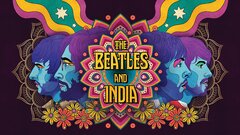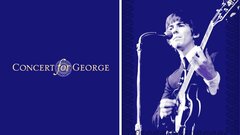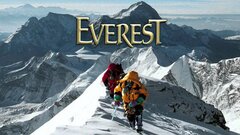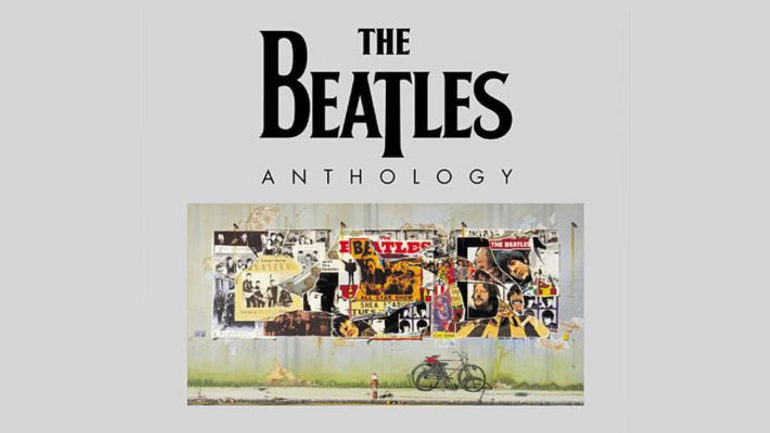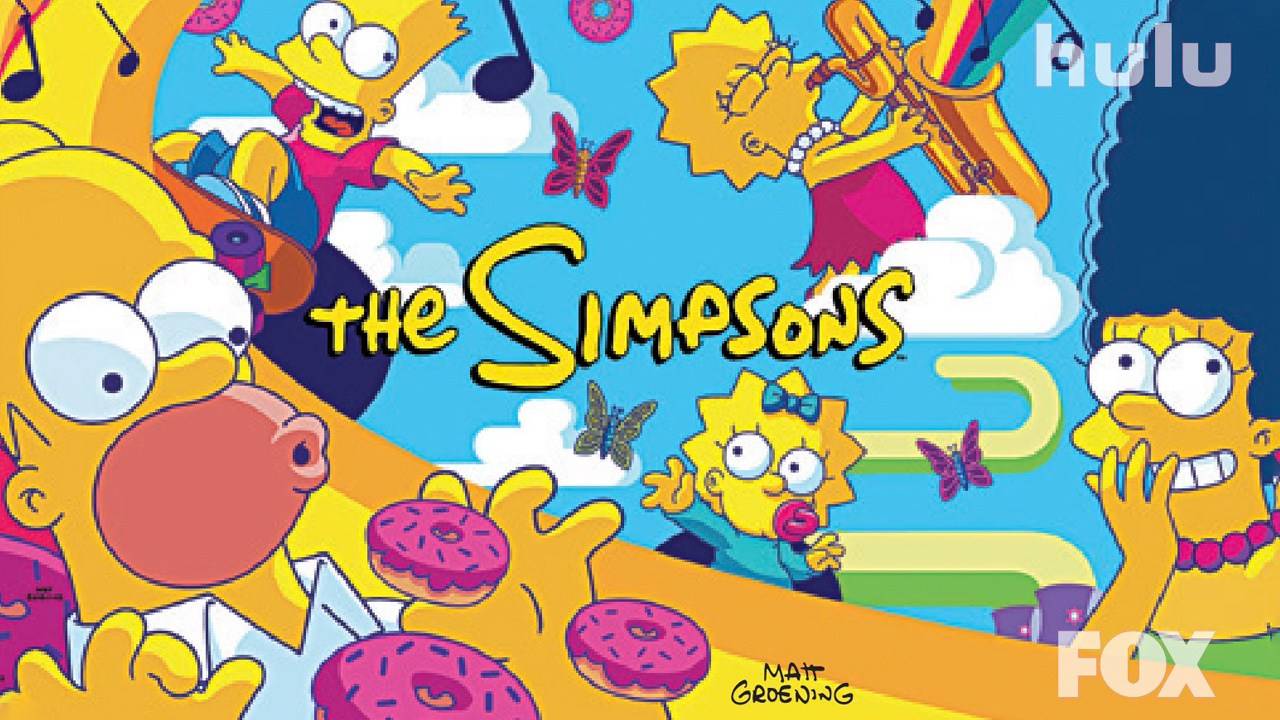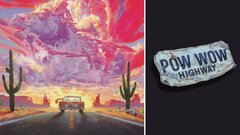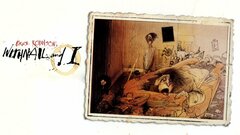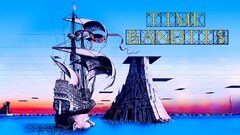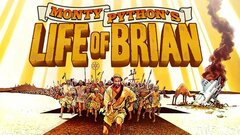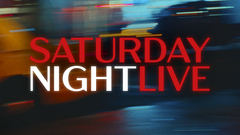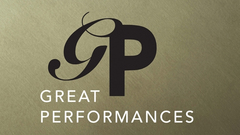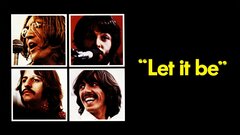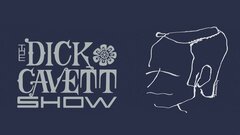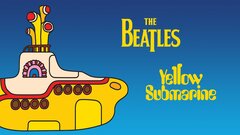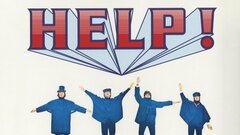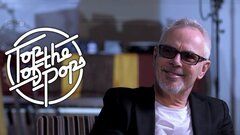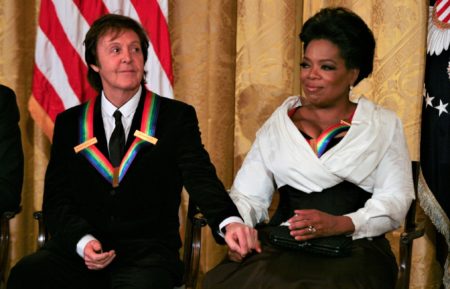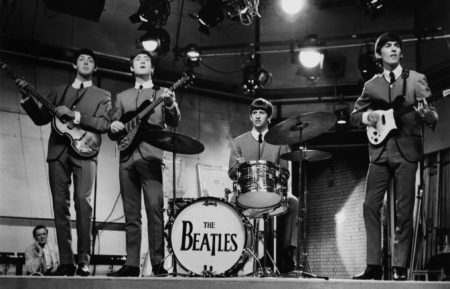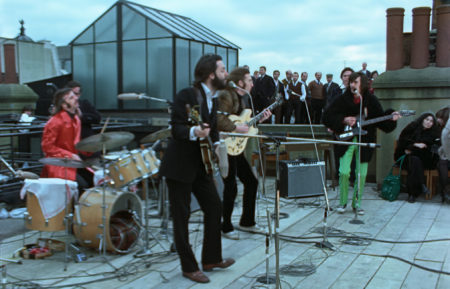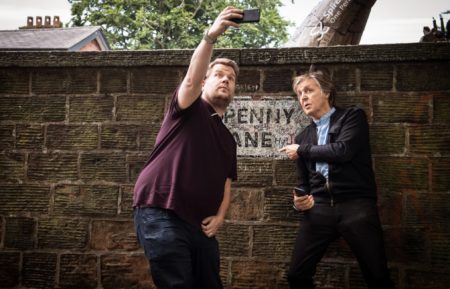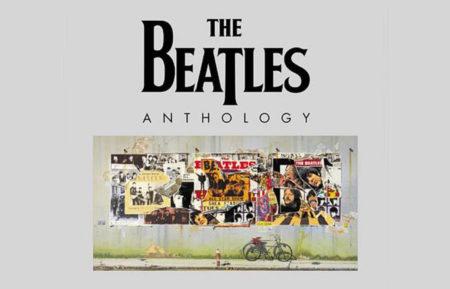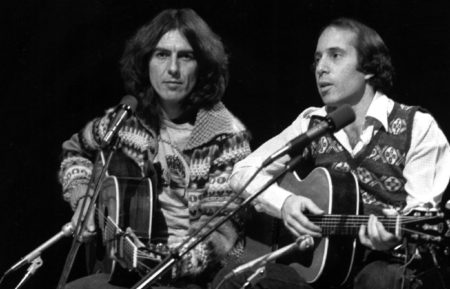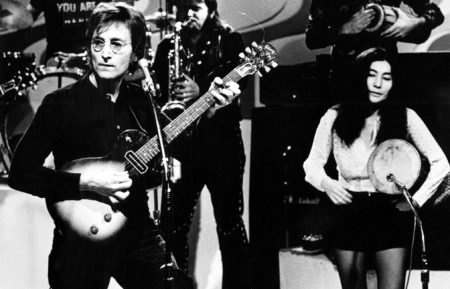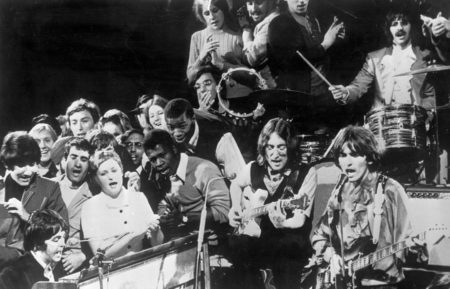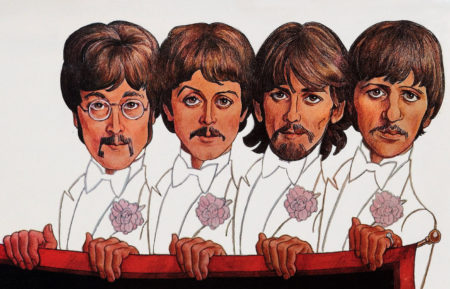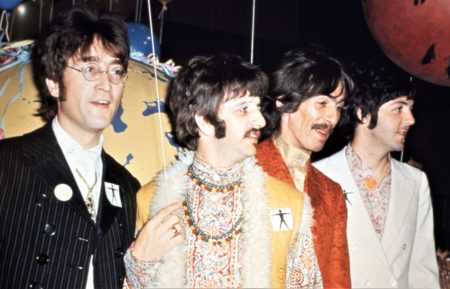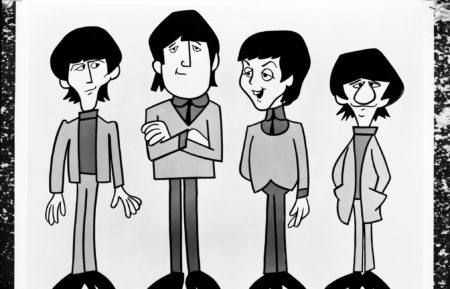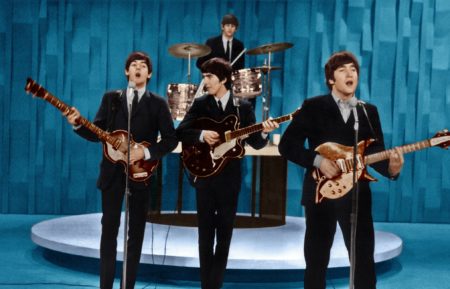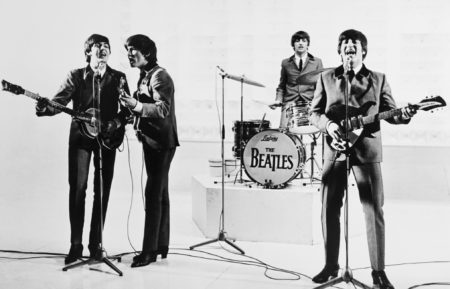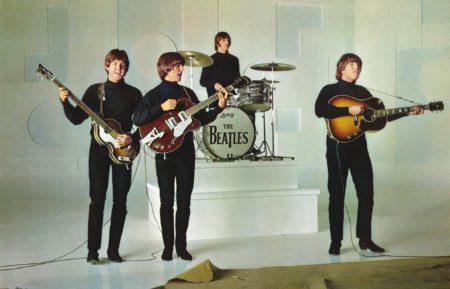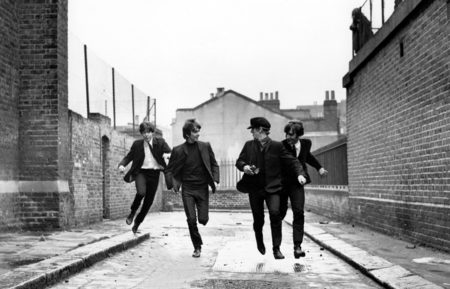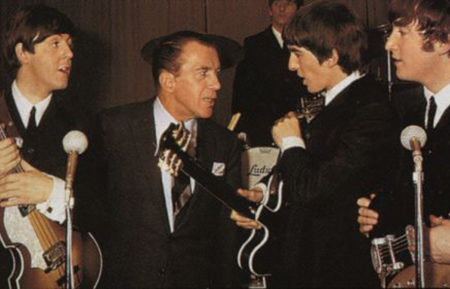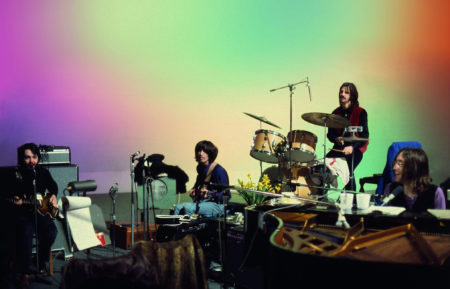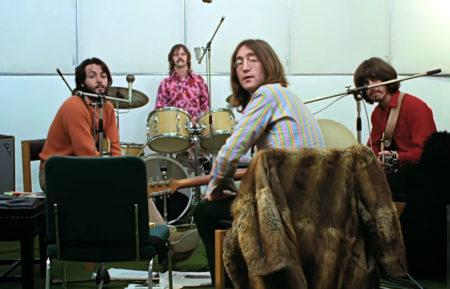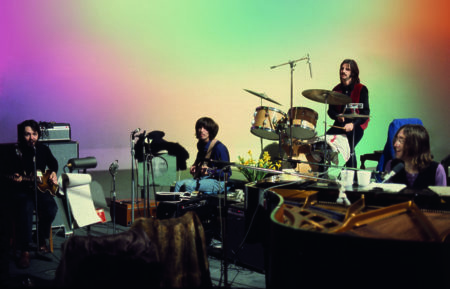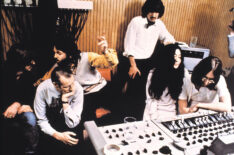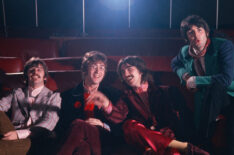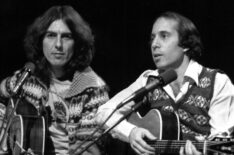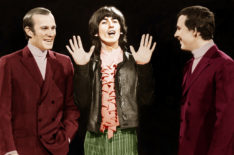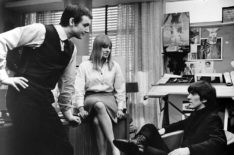Known to millions of fans as "the quiet Beatle," George Harrison's life during and after the Fab Four was anything but retiring. As the singer-songwriter of two of the band's most immortal hits, "Here Comes the Sun" and "Something," Harrison's sharp wit and musical chops were unfortunately often overshadowed by the leaders of the band, John Lennon and Paul McCartney. A devoted student of rock 'n' roll and Eastern philosophy, he blended both in his successful solo music career, which yielded such enduring classics as the triple album All Things Must Pass and hit songs like "My Sweet Lord."
His later work in film production through his HandMade Films company brought beloved film classics like "Monty Python's The Life of Brian," "Time Bandits," and "Withnail and I" to audiences around the world. But mostly, Harrison concentrated on enjoying life with his family and many friends, who counted him as a loving and spiritual individual. When he passed away from cancer in 2001, the world mourned the Baby Beatle and music historians and fans paid tribute to his special genius in a way many felt should have happened in his lifetime.
Born in Liverpool, England on Feb. 24, 1943, Harrison was the youngest of four children born to Harold Harrison, a navy man turned city bus driver, and his wife Louise, who taught ballroom dancing. The family relocated from Wavertree, Liverpool, to Speke, where he was awarded a place at the Liverpool Institute for Boys. It was at this school where he befriended an older fellow student, Paul McCartney.
Never much for formal education, Harrison left school in the summer of 1959, working days as an apprentice electrician at Blacklers department store - which would serve him well later on when setting up sound equipment - while devoting his nights to music, specifically the skiffle sound popularized by Lonnie Donegan, as well as American guitarists like Chet Atkins and Buddy Holly. He eventually formed a short-lived skiffle group called The Rebels with his older brother Peter.
Harrison's parents supported his musical pursuits, even purchasing his first guitars, though father Harold secretly hoped he would make his electrician apprenticeship his vocation. The die was cast, however, when in 1958 he saw McCartney perform in the skiffle group the Quarrymen, a band led by 18-year-old John Lennon, who was initially reticent to allow the then-14-year-old into the group. At the same time, he was impressed with his guitar skills. Two weeks later, Harrison was playing lead guitar for them at local events, many booked by Harrison's father, who was the chairman of a local social committee. Harrison's mother was also a frequent and vocal concertgoer at her son's early shows.
Friction within the band led to its dissolution in early 1959, leaving Harrison to move on to another local outfit, The Les Stewart Quartet. Problems within that group led to Harrison recruiting McCartney and Lennon to fill in for the absent players, with the band quickly adopting their Quarrymen moniker again. Several name changes and the addition of two new members - bassist Stu Sutcliffe and drummer Pete Best - followed before the group settled on the name The Beatles, and Harrison soon found himself heading overseas to Hamburg, Germany, to play a regular series of gigs at the Indra Club and later the Kaiserkeller.
Despite his enthusiasm and self-training, Harrison still struggled with his solos, and was frequently coached by McCartney. Eventually, he developed an emphatic, ringing style that suggested the stinging twang of American rockers Duane Eddy and Carl Perkins, his earliest influences. He honed his technique during the punishing schedule of their German shows, which lasted six or seven hours at a stretch for an entire week, and were largely fueled by amphetamines.
Harrison's German adventures came to an immediate halt after McCartney and Best set a small fire in their living quarters; both were arrested before being deported, with Harrison following suit after it was discovered that he had lied about his age. The group (minus Sutcliffe) reunited in Liverpool in 1960 to play the Casbah Club before returning to Germany to play the Top Ten Club and press some of their earliest recordings as "The Beat Brothers," the backing outfit for singer Tony Sheridan. The following year, they returned to Liverpool to play their now legendary shows at the Cavern Club, where they were introduced to manager Brian Epstein. In turn, he brought them to producer George Martin at Parlophone Records, where after the dismissal of Pete Best in favor of Ringo Starr, the Beatles signed their first record contract and began cutting their first album, Please Please Me.
By 1963, the Beatles had taken England by storm, with America soon to follow. In early 1964, Beatlemania officially hit worldwide, when the band set down at New York's JFK airport for an appearance on "The Ed Sullivan Show" (CBS, 1948-1971). Life would never again be the same for the "Baby Beatle," a young man who would grow to become the band's most vocal critic of the fishbowl existence the foursome would be forced to live in from that moment forward.
Harrison's tenure in the early Beatles was not always an easy one. His guitar was often buried beneath Lennon and McCartney's rhythm section in recordings, and producer Martin was notoriously difficult on Harrison. He tended to maintain an introspective attitude in the face of rampaging Beatlemania - which led to him being dubbed "the quiet Beatle" - but could be counted on for the occasional quip in press conferences, often besting even Lennon in the witticisms department, which was no small task.
By 1963, he was getting the occasional lead vocal on tracks, most notably "Do You Want to Know a Secret." Harrison's first solo songwriting contribution to the group was "Don't Bother Me," which he wrote while nursing an illness that same year, largely to see if he could pull it off. (He would not land another song on a Beatles album until 1965's Help! soundtrack.) While struggling with his backseat status in the group, Harrison steadily developed the unique aspects of his musical career.
In 1964, he received a 12-string guitar from the Rickenbacker company, and became so enamored of its sound that he began using it regularly in studio sessions. The Rickenbacker's unique chiming sound later became an indelible part of Harrison's musical persona; so much so, that bands like The Byrds adopted them as part of the wholesale influence of the Beatles upon their own music.
In 1965, Harrison became fascinated by the sitar, and by Indian music as a whole, seeing in it possibly a way to forge his own musical identity. While on tour in Asia, Harrison purchased a sitar and became the first Western musician to play one on a pop record for the song "Norwegian Wood (This Bird Has Flown)" from the Beatles' revolutionary 1965 record, Rubber Soul. He also became fascinated with Indian culture and religion during the filming of the movie "Help!" in 1965. The gift of a book on Hinduism made him embrace the religion whole-heartedly, and became a major force in his life until his death.
By the mid-1960s, Harrison's role in the Beatles was gradually developing into something of a more equal partnership between his contributions and those of Lennon/McCartney. His songwriting had matured considerably, with his material tending to reflect his own mercurial personality. He could be wistfully romantic ("If I Needed Someone") or wryly anti-authoritarian ("Taxman"), often on the same album. His appreciation for Indian music also continued to blossom, thanks to intensive studies with master Indian musician Ravi Shankar, whom he had befriended. His mastery of its complex signatures and instruments could be heard on songs like "Love You To" from Revolver.
His personal life bloomed during this period as well. After meeting model and film extra Patti Boyd on the set of "A Hard Day's Night" (1964), he asked her to marry him. Two years later, his offhanded jest became reality. Boyd later accompanied Harrison on a trip to India in 1966, where he furthered his studies of music and philosophy. She also introduced the Beatles to the Maharishi Mahesh Yogi, who trained them in Transcendental Meditation in 1968. Boyd would later famously inspire one of the most beautiful of all Beatle love songs, "Something" from Abbey Road, written for her by her husband; a song that would become the second most covered Beatle song behind McCartney's "Yesterday."
In the late '60s, Harrison became close friends with fellow U.K. guitarist Eric Clapton, who had risen to superstar ranks thanks to his extraordinary talent and stints in three prominent bands, The Yardbirds, John Mayall and the Bluesbreakers, and Cream. The two men collaborated on one another's songs on several occasions, most notably the tongue-in-cheek Cream tune "Badge" (co-written by Harrison) and Harrison's "While My Guitar Gently Weeps." Clapton also introduced Harrison to the slide guitar through his friend Delaney Bramlett, an introduction that caused Harrison to switch loyalties, replacing the Rickenbacker as his signature guitar sound. The two men also shared a common passion in Boyd. Unbeknownst to Harrison, Clapton had fallen desperately in love with his best friend's wife, pouring his unrequited love into the album Layla and Other Assorted Love Songs (1970), which featured the epic title tune secretly written for Boyd; Boyd and Harrison would divorce in 1977 and Clapton and Boyd would marry two years later. Harrison, surprisingly, would give the union his blessing, saying he was glad she "was with Eric and not some dope."
By the late 1960s, Harrison's relationship with the Beatles had begun to unravel. Though he had clearly proven himself as a guitarist and songwriter, he was still unable to place more than one or two songs on each album. His majestic "Within You, Without You" was his sole contribution to the group's landmark 1967 LP Sgt. Pepper's Lonely Hearts Club Band, and Harrison wrote just four of the 30 songs on 1968's The Beatles.
Tension between the band members reached an all-time high during recording of the latter album, growing even worse in early 1969 when they commenced work on what would become their final two albums, Abbey Road (1969) and Let It Be (1970). Suggestions for a return to live performing; McCartney's new, self-imposed status as group leader; the presence of a film crew (recording what would later be the 1970 documentary "Let It Be"); and the band's continued refusal to respect Harrison's compositions led him to leave the band in January 1969.
He eventually returned to the fold after two weeks of complicated legal wrangling, managing to place some of his best-known songs on the two albums: "Something" - his first song to land the A-side of a Beatles single - and "Here Comes the Sun" on Abbey Road; "I Me Mine" (later the title of Harrison's autobiography) and the shuffling blues number "For You Blue" on Let It Be. By the time the latter album was released in 1970, the Beatles had called it quits, much to the dismay of the world at large.
All four Beatles began work on solo albums shortly before or after the band's breakup, but Harrison's effort, 1970's All Things Must Pass, was the first LP from any of the former Beatles to reach the top of the charts. He had released two solo experimental LPs while still in the group: 1968's Wonderwall Music, which served as the soundtrack for the movie "Wonderwall," and 1969's Electronic Sound, a two-track LP recorded entirely on the Moog synthesizer. The massive three-record set All Things Must Pass contained numerous songs that he had written during his Beatle days, as well as new material like "My Sweet Lord" and "Isn't It a Pity." The album's gorgeous sonic qualities - enhanced by Phil Spector's "wall of sound" production - and the presence of Starr, Clapton, longtime Beatles associate Billy Preston, and members of Badfinger and Derek and the Dominos signaled to music fans that Harrison had finally stepped out from the formidable shadows cast by Lennon and McCartney and asserted his own place as a top musical talent.
Unfortunately, controversy soon marred the album's runaway success. The publishers of the 1962 R&B hit "He's So Fine" by the American group The Chiffons brought a suit against Harrison that claimed he had plagiarized their song while recording "My Sweet Lord." The lawsuit brought royalties earned by the song to a halt, and the protracted legal battle that followed eventually ended with Harrison guilty of "unconsciously" copying the Chiffons number, forcing him to pay almost $600,000 to its publishers. Though he later poked fun at the incident with his Top 25 hit "This Song" in 1976, the incident was the first in a series of unfortunate business and legal problems in Harrison's solo career.
Harrison's best intentions were also thwarted when he organized the Concert for Bangladesh, the first major charity concert put together by a popular recording artist. The show, which was meant to provide relief to citizens of the famine-stricken country of Bangladesh, took place at Madison Square Garden in 1971 and featured Harrison alongside Clapton, Starr, Preston, and Bob Dylan. Unfortunately, tax issues and the machinations of Apple Corps executive Allen Klein resulted in little of the $243 million raised by the concert and album reaching Bangladesh.
Despite these problems, Harrison kept very busy throughout the early 1970s. He released two more solo albums, 1973's Living in the Material World and 1974's Dark Horse (later the name of his record label), which yielded singles like "Give Me Love (Give Me Peace on Earth") and "Ding Dong, Ding Dong." He also toured the United States behind Dark Horse, but received less than favorable reviews, due to a long mid-concert set by Ravi Shankar. It seemed not everyone was into Indian music, but Harrison did not care. In addition to his own records, Harrison co-wrote and played on singles and albums by Lennon, Starr, Harry Nilsson, Badfinger and Billy Preston. The biggest rift appeared to still be between him and McCartney, the one Beatle who he had known the longest, but who had also treated him the most dismissively, like an older brother might do.
In 1974, Harrison met Olivia Arias, who was employed as a secretary at Dark Horse after he set up the label's offices on the A&M lot in Hollywood. A relationship blossomed during the "Dark Horse" tour, paving the way for the couple to marry in 1978, following Harrison's divorce from Boyd. They would go on to have one son, Dhani, who followed in his father's footsteps as a musician in the 1990s and 2000s. Unfortunately, Harrison's personal happiness was not reflected by his music career. 1975's Extra Texture failed to dent the U.S. charts, despite two Top 20 singles ("You" and "This Guitar (Can't Keep from Crying)"), and former label Capitol released a greatest hits compilation, The Best of George Harrison (1976) without consulting him about the track listings. Legal woes and the strain of his divorce from Boyd forced him to halt recording of a new album, 33 1/3. With that, new label A&M promptly sued him for late delivery, only adding to his business woes. Thankfully, Warner Bros. stepped in to purchase his contract, and the label distributed all of Harrison's subsequent efforts on Dark Horse for the rest of his career.
The audience response to 33 1/3 was more positive than Extra Texture, and the album yielded two hit singles, including "This Song." He also released a self-titled solo album in 1979, which went Top 20 and included the hit "Blow Away" as well as "Not Guilty," a song originally slated for The Beatles. But as the 1970s came to a close, Harrison's attentions wandered afar from the music field, which he found difficult to fathom in its current incarnation; instead, he devoted more time to HandMade Films, a movie production company he co-founded to help his friends in the comedy group Monty Python produce their 1979 film, "The Life of Brian." HandMade soon blossomed into one of the most promising film companies in England, with "The Long Good Friday" (1980), "Time Bandits" (1982) and "Mona Lisa" (1986) among its stable of hits. He also penned his autobiography in 1980, which, sadly, spent more time discussing his growing interest in gardening and Formula One racing than his experiences with the Beatles. A well-known comedy buff, Harrison appeared as a television news reporter in the Beatles film parody "The Rutles: All You Need Is Cash" (1978), written by and starring his longtime friend, Eric Idle.
While working on the album Somewhere in England (1981), Harrison received word that his former band mate and personal idol of sorts, John Lennon, had been murdered by a deranged fan outside of his NYC apartment in December 1980. The incident proved devastating for Harrison. Not only did it reinforce his concern over zealous and possibly dangerous fans, but it also left him in painful regret, as his pride had prevented him from reaching out to Lennon after he had received word that he (Lennon) had been hurt by the relatively little coverage he had received in Harrison's autobiography. A guilt-stricken Harrison quickly reworked a single he had penned for Starr called "All Those Years Ago" to reflect on the recent tragedy, inviting Starr and McCartney to contribute vocals to the single, which marked the first time all three had performed together since the Beatles' breakup in 1969. The single charted well, but the album was an underperformer, which added insult to injury for Harrison. Warner Bros. had rejected the LP upon its initial submission, forcing him to drop four songs and change the cover art. Already feeling out of place in the current music scene, Harrison essentially turned his back on the music industry for the next five years. He completed his contract with Warner Bros. by releasing the half-hearted Gone Troppo (1982), choosing instead to focus on HandMade's stable of new productions, his own personal hobbies and spending time with his family.
But by 1986, Harrison was itching to return to recording. He contacted former Electric Light Orchestra frontman Jeff Lynne (an obsessive Beatles fan) and pulled longtime friends Clapton, Starr, Elton John and Jim Keltner into the sessions, which eventually yielded the fresh and upbeat Cloud Nine (1987). Buoyed by an ebullient cover of James Ray's 1962 R&B song "Got My Mind Set On You," Harrison soon found himself with a No. 1 single and a Top 10 album, his first in 15 years. A second single, "When We Was Fab," paid gently humorous tribute to the Beatles - Harrison had come to affectionately call his old band "The Fabs" - and broke the Top 30. With so much success at hand, some speculated that Harrison would launch his first tour since the disastrous "Dark Horse" jaunt. This would not come to pass, though Harrison would join Eric Clapton on a joint tour of Japan in 1991, which was documented in a terrific concert album, Live in Japan (1992).
Instead, Harrison decided to keep with the loose and friendly vibe of Cloud Nine for another album. Having brought together Lynne and friends Bob Dylan, Tom Petty and veteran rocker Roy Orbison to record a B-side for the European release of the Cloud Nine single "This is Love," the resulting song, "Handle with Care," enthused the quintet to work on a whole record, which was delivered under the persona of a sibling act called The Traveling Wilburys. To the industry's surprise, the album, Vol. 1 (1988) reached double platinum status and revived Orbison's long-dormant career, in addition to winning a 1989 Grammy. Sadly, a follow-up with the original band configuration was quashed when Orbison died in late 1988. Attempts to replace him with Del Shannon were shattered when the "Runaway" singer committed suicide in 1990, and the group's Volume 3 was released that same year to slightly less acclaim.
During this period, Harrison was inducted into the Rock and Roll Hall of Fame as a member of the Beatles in 1988. (He was inducted posthumously as a solo artist in 2004). Meanwhile, Harrison released his own approved greatest hits compilation, The Best of Dark Horse (1976-1989), which featured two new tracks, in 1989, and made a rare live appearance in the States at a tribute to Bob Dylan at Madison Square Garden in 1992. In 1994, Harrison began collaborating with McCartney and Starr on what would eventually become "The Beatles Anthology," a massive documentary project that covered the history of the group from the members' point of view. Interviews with Harrison and his two surviving band mates (as well as archival interviews with Lennon) were eventually developed into a five-part documentary for television, a book, and three CDs that culled early recordings, outtakes and live recordings from the Beatles' entire musical output. Perhaps most special to Beatles fans was the inclusion of two "new" Beatles tracks, "Free As a Bird" and "Real Love," which were Lennon demos that were fleshed out by the other members. The idea of reworking the songs was Harrison's idea, and their efforts were rewarded with two Top 10 singles and a Grammy. The project's unparalleled success came at a crucial time for Harrison, who had suffered a serious financial setback due to the failure of several HandMade projects, including Terry Gilliam's astronomically expensive "The Adventures of Baron Munchausen" (1989). The company was later bought by Paragon Entertainment in 1994.
To the utter devastation of Beatle fans still not over losing Lennon nearly 20 years prior, Harrison was diagnosed with cancer in 1997. A former heavy smoker, the disease manifested itself in his throat and lungs, which necessitated the removal of growths. Despite his condition, Harrison busied himself with various projects, including guest appearances on albums by Bill Wyman and Lynne's revamped ELO, as well as tracks that would eventually become his final solo release, Brainwashed. While working on the album, Harrison suffered a traumatic assault in his own home in 1999. A deranged fan had broken into his famously secure estate, stabbing him multiple times (and puncturing his already diseased lung) before being disarmed single-handedly by Harrison's wife, who knocked him over the head with a lamp and poker. The attacker, who claimed that he was on a religious mission to kill Harrison, was later acquitted on grounds of insanity, much to the amazement of a public which could hardly believe a second Beatle's life had been threatened. Already leery of unbalanced fans after the murder of Lennon, Harrison retreated from public view and focused on completing Brainwashed with the help of his son Dhani.
In 2001, Harrison's cancer unfortunately returned at full force and was, this time, diagnosed as terminal. Determined to complete the album, he collaborated closely with Dhani and Lynne on recording the tracks in Switzerland before traveling to the United States for treatment. In the months prior to his death, Harrison was visited by his many lifelong friends and musical partners, including McCartney - who was finally able to make peace with his "kid brother" - before dying from lung cancer on Nov. 29, 2001. It was widely reported in the press that his ashes were scattered at the banks of the Ganges River in India, but this was never confirmed. His death, so shortly on the heels of the 9/11 terrorist attack, cast a pall on fans around the world who could hardly believe two Beatles had died before their time.
In November 2002, Brainwashed was released to critical acclaim and a Top 20 listing on the record charts. The single "Marwa Blues" earned him a posthumous Grammy in 2004. Shortly after the release of his final album, many of Harrison's musical friends gathered at London's Royal Albert Hall to pay tribute to his musical legacy in a benefit concert organized by his widow. Among the performers were McCartney and Starr, along with Clapton, Petty, Lynne, and Harrison's son Dhani. Harrison's Beatles tracks "Something," "Here Comes the Sun," and "While My Guitar Gently Weeps" were remixed and re-orchestrated by original producer George Martin and his son Giles as part of the soundtrack for the Las Vegas-based Cirque du Soleil production "Love," which told the history of the Beatles in impressionistic terms. The show itself was born from discussions between Harrison and Guy Laliberte, one of the troupe's founders. It debuted in June 2006 at the Mirage Hotel and Casino, where a Beatles-inspired lounge called "Revolution" was also opened in tandem. And teenage girls fell in love with the Beatles' music all over again when it provided the inspiration for Julie Taymor's surreal fantasy "Across the Universe" (2007). The film, which became a cult hit with younger audiences, featured three Harrison compositions: "Something," "While My Guitar Gently Weeps" and "Blue Jay Way."




